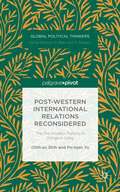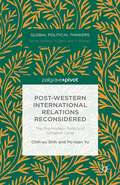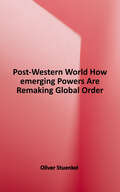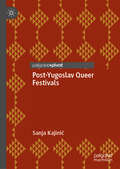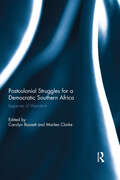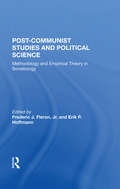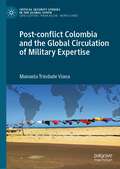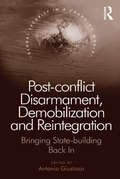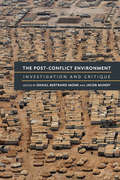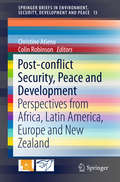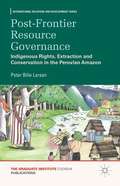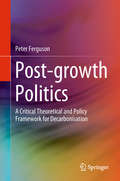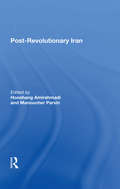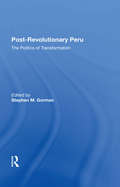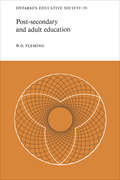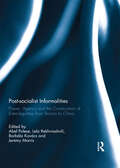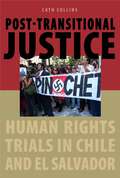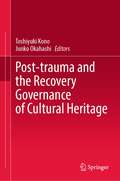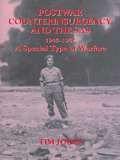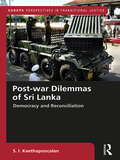- Table View
- List View
Post-War Statebuilding and Constitutional Reform: Beyond Dayton in Bosnia (Rethinking Peace and Conflict Studies)
by Sofía Sebastián-AparicioSebastián explores the experience of statebuilding and constitution making after violent conflict, using the failed reform of Dayton in Bosnia and Herzegovina as a case study to reflect upon the fundamental questions of post-war statebuilding, reform and the role of local and external actors.
Post-Western International Relations Reconsidered: The Pre-Modern Politics of Gongsun Long (Global Political Thinkers)
by Chih-Yu Shih Po-Tsan YuPost-Western International Relations Reconsidered.
Post-Western International Relations Reconsidered: The Pre-Modern Politics of Gongsun Long (Global Political Thinkers)
by Chih-yu Shih Po-tsan YuThis study offers a critique of international relations from the perspective of a pre-modern Chinese thinker, Gongsun Long. It explores both the potential and the danger of the post-Western quest for geo-cultural distinction.
Post-Western World: How Emerging Powers are Remaking Global Order
by Oliver StuenkelWith the United States' superpower status rivalled by a rising China and emerging powers like India and Brazil playing a growing role in international affairs, the global balance of power is shifting. But what does this mean for the future of the international order? Will China dominate the 21st Century? Will the so-called BRICS prove to be a disruptive force in global affairs? Are we headed towards a world marked by frequent strife, or will the end of Western dominance make the world more peaceful? <p><p>In this provocative new book, Oliver Stuenkel argues that our understanding of global order and predictions about its future are limited because we seek to imagine the post-Western world from a parochial Western-centric perspective. Such a view is increasingly inadequate in a world where a billions of people regard Western rule as a temporary aberration, and the rise of Asia as a return to normalcy. In reality, China and other rising powers that elude the simplistic extremes of either confronting or joining existing order are quietly building a "parallel order" which complements today's international institutions and increases rising powers' autonomy. Combining accessibility with expert sensitivity to the complexities of the global shift of power, Stuenkel's vision of a post-Western world will be core reading for students and scholars of contemporary international affairs, as well as anyone interested in the future of global politics.
Post-Yugoslav Cinema: Towards a Cosmopolitan Imagining
by Dino MurticDrawing primarily on selected filmic texts from former-Yugoslavia, the book examines key social and political events that triggered the Yugoslav wars in the 1990s. Yugoslav politics and society are set within the broader artistic and cinematic strategies that helped stabilise post-Yugoslav territories strategies that were part of the national desire of looking forward to a time of 'perpetual peace' and its subsequent cosmopolitan norms. It argues that filmic texts demonstrate the degree to which nationalism was at the heart of the violent disintegration of Yugoslavia. Yet, the concern of the argument is not simply to offer a filmic critique but to develop an alternative to nationalism; namely, a theoretical framework through which cosmopolitan humanism is at the forefront of addressing former Yugoslavia's political wounds.
Post-Yugoslav Queer Festivals
by Sanja KajinićThis book explores two festivals over ten years: Queer Zagreb and Ljubljana Gay and Lesbian Film Festival. Kajinić focuses on the festivals’ participation in a regional network of queer festivals and provides an insight into how these festivals and their audiences negotiated the limits of non-normativity in particularly intensive ways between 2002-2012. By offering an interdisciplinary perspective and exploring the possibilities of critical visual methodology, the author relates the history of these important cultural projects and their organizational practices to the ways in which they impacted the lives of their participants.Post-Yugoslav Queer Festivals will be of interest to readers studying the region of Southeast Europe from a range of perspectives including gender studies, history, politics and festival studies.
Post-colonial struggles for a democratic Southern Africa: Legacies of Liberation
by Carolyn Bassett and Marlea ClarkeNational liberation, one of the grand narratives of the twentieth century, has left a weighty legacy of unfulfilled dreams. This book explores the ongoing struggle for legitimate, accountable political leaders in postcolonial Southern Africa, focussing on dilemmas arising when ex-liberation movements form the governments. While the spread of multi-party democracy to most countries in the region is to be celebrated, democratic practice often has been superficial - a limited, elitist politics that relies on the symbols of the liberation struggle to legitimate de facto one-party rule and authoritarian practices. Using country cases from Tanzania, Swaziland, Zimbabwe, South Africa and Zambia, the collection explores three subthemes relevant to postcolonial governance in Southern Africa: how the struggle for liberation shapes the character of political transformation, the nature of rule in one-party dominant states headed by former liberation movements, and the processes of governance and resistance in post-liberation contexts.This book was published as a special issue of the Journal of Contemporary African Studies.
Post-communist Nostalgia (Berghahn Ser.)
by Zsuzsa Gille Maria TodorovaAlthough the end of the Cold War was greeted with great enthusiasm by people in the East and the West, the ensuing social and especially economic changes did not always result in the hoped-for improvements in people's lives. This led to widespread disillusionment that can be observed today all across Eastern Europe. Not simply a longing for security, stability, and prosperity, this nostalgia is also a sense of loss regarding a specific form of sociability. Even some of those who opposed communism express a desire to invest their new lives with renewed meaning and dignity. Among the younger generation, it surfaces as a tentative yet growing curiosity about the recent past. In this volume scholars from multiple disciplines explore the various fascinating aspects of this nostalgic turn by analyzing the impact of generational clusters, the rural-urban divide, gender differences, and political orientation. They argue persuasively that this nostalgia should not be seen as a wish to restore the past, as it has otherwise been understood, but instead it should be recognized as part of a more complex healing process and an attempt to come to terms both with the communist era as well as the new inequalities of the post-communist era.
Post-communist Regime Change: A Comparative Study (Routledge Research in Comparative Politics)
by Jørgen MøllerThis book seeks to explain the divergent political pathways of twenty six post-communist states, following the breakdown and eventual collapse of communism in 1989-1991. Considering the trajectories of individual states between 1990 – 2007, this book challenges two central bodies of theory relating to democratization and regime change. Through a sustained analysis of global and post-communist developments within this time period, the author shows that claims of an increasing asymmetry between the ‘electoral’ and ‘liberal’ elements of modern democracy have been greatly exaggerated. The author goes on to contend that in accounting for the geographical dispersion of post-communist regime forms, deeper structural factors should be considered as crucial. The book is divided into the following parts: Part I demonstrates how different conceptualisations of democracy can lead to very different conclusions about the empirical dynamics of democratization. Part II contrasts different explanations of post-communist political change and provides an integrated framework for explaining the political pathways encountered within the former Eastern Bloc. This book will be of interest to students and scholars of post-communist studies, democratization studies, comparative politics and regime change.
Post-communist Studies And Political Science: Methodology And Empirical Theory In Sovietology
by Jr. Fleron Erik P HoffmannSerious stock-taking is in progress now among practitioners of whathas been called Sovietology, meaning studies of the Union of SovietSocialist Republics. The reason is that the field for the most part hadnot been expecting what happened in 1991: The USSR collapsed andwent out of existence as a unified state system governing a sixth ofthe world's territory, having allowed its East European empire tofree itself from Soviet dominance somewhat earlier.It might be said in defense of Sovietology that, by the beginningof the 1980s, it understood that economic and political crises werebrewing in the Soviet Union and its outer empire. But the field asa whole failed to grasp the full depth of the systemic crisis in SovietRussia and the destructive or self-destructive potentialities inherentin it. As the editors of this valuable volume write in the Introduction:"Sovietology was not prepared for perestroika and postcommunism."
Post-conflict Colombia and the Global Circulation of Military Expertise (Critical Security Studies in the Global South)
by Manuela Trindade VianaBy challenging more common analyses that point to the existence of a "post-conflict scenario" in Colombia and those that resist the narrative of "success", both of which operate within the logic of presence/absence of violence, this book proposes instead that we think of "post-conflict" in terms of the transformation of the rules on the use of violence. The analysis unfolds in two parts: the first explores the conditions of possibility of the Colombian “success story” and the web of criteria legitimizing the “success”, as well as the silencing mechanisms allowing for Colombia to circulate internationally as a formula to be replicated in other parts of the world; the second, focuses on the historicization of the mechanisms through which new rules are transmitted among the professionals of the public force, specifically the transformations of military schools and training centers in Colombia from times of “war” to “peace”. The author argues that key to this transformation is a unique discursive articulation around the “military professional” which slides from “citizen-soldier” to “expert-soldier”.
Post-conflict Disarmament, Demobilization and Reintegration: Bringing State-building Back In (Global Security in a Changing World)
by Antonio GiustozziThis book revisits post-Cold War Disarmament Disintegration and Reintegration (DDR) programmes in the light of previous experiences of disarmament, demobilisation and reintegration. In the history of North America and Europe, in particular, such programmes had a major impact on state-building, contributing to the development of the welfare state, shaping political settlements and directing government policy to maintain social peace. The authors in this important book ask what is left of these state-building dimensions in contemporary DDR programmes and whether the constraints imposed by international organisations on DDR programmes have more negative effects than positive ones. The role of political leadership in DDR processes is highlighted: can bureaucratically-driven processes deliver success? Only if political elites take full control and manage DDR programmes can there be a lasting impact on state-building. Even then, most political elites avoid deep changes in their relationship with the veterans. Is there a chance of reshaping international intervention in such a way as to favour the development of a 'social contract' between political elites and veterans? In taking a historical perspective, this book is unique in the existing literature on DDR and will be essential reading for policy makers, students and scholars of conflict studies, and those working in NGOs, particularly donor agencies. This volume was produced with the contribution of the Crisis States Research Centre (LSE).
Post-conflict Environment: Investigation And Critique
by Daniel Bertrand MonkIn case studies focusing on contemporary crises spanning Africa, the Middle East, and Eastern Europe, the scholars in this volume examine the dominant prescriptive practices of late neoliberal post-conflict interventions--such as statebuilding, peacebuilding, transitional justice, refugee management, reconstruction, and redevelopment--and contend that the post-conflict environment is in fact created and sustained by this international technocratic paradigm of peacebuilding. Key international stakeholders--from activists to politicians, humanitarian agencies to financial institutions--characterize disparate sites as "weak," "fragile," or "failed" states and, as a result, prescribe peacebuilding techniques that paradoxically disable effective management of post-conflict spaces while perpetuating neoliberal political and economic conditions. Treating all efforts to represent post-conflict environments as problematic, the goal becomes understanding the underlying connection between post-conflict conditions and the actions and interventions of peacebuilding technocracies.
Post-conflict Security, Peace and Development: Perspectives From Africa, Latin America, Europe And New Zealand (Springerbriefs In Environment, Security, Development And Peace Ser. #13)
by Christine Atieno Colin RobinsonThis book examines links between post-conflict security, peace and development in Africa, Latin America, Europe and New Zealand. Young peace researchers from the Global South (Uganda, Ivory Coast, Kenya, Brazil, Colombia) as well as from Italy and New Zealand address in case studies traumas in Northern Uganda, demobilisation and reintegration of ex-combatants in the Ivory Coast, economic and financial management of terrorism in Kenya, organised crime in Brazil, mental health issues in Colombia, macro realism in Europe and global defence reforms within the military apparatus since 1990. The book reviews linkages between regional stability, development and peace in post-conflict societies while adding on to the post 2015 international agenda and discusses linkages between peace, security and development.
Post-frontier Resource Governance
by Peter Bille LarsenThe 20th century involved an unprecedented scramble for resources reaching the most remote corners of the world. Simultaneously, a quiet revolution has taken place with environmental protection, land and community rights regimes gradually taking hold, albeit unevenly, across the global South. Institutional topographies and policies have never before appeared as green and socially inclusive, yet co-exist with a deepening socio-environmental crisis. Intensified pressures stand in contrast to,persist, and even thrive under new environmental and social protection measures. The author offers an anthropological analysis of the paradox. Building on the concept of post-frontier governance, he presents a portrayal of the host of new regulatory technologies, practices and institutions that nominally close, yet more accurately characterize and restructure, contemporary resource frontiers. The book examines these arrangements ethnographically in the Peruvian Amazon by focusing on the Y#65533;nesha people and their involvement with the organization of indigenous rights, conservation and protected area planning, logging, and oil development.
Post-growth Politics: A Critical Theoretical and Policy Framework for Decarbonisation (Green Energy and Technology)
by Peter FergusonThis book uses a critical political economy approach to develop an historically and politically grounded set of strategies for states to move toward a post-growth, decarbonised global economy. It begins by examining the social and ecological costs of and limits to economic growth and determines that significant decarbonisation of the global economy can only be achieved if conventional growth-based economies are replaced by an alternative post-growth economy.Set apart from many other works in the field by its critical political economy approach to policy development, this book offers the reader three distinctive features. First, it places the analysis in historical context in order to demonstrate how the global political economy is constantly changing with respect to distributions of wealth, power and fundamental norms, and explores how states might harness and transform these contingent patterns in a post-growth direction. Second, the book is not only concerned with developing and advocating post-growth policies, but also with how these measures can be incorporated into the high-level domestic and international strategies pursued by states to ensure their political legitimacy and economic and geopolitical survival. Third, rather than proposing an idealised and politically naïve model of socioecological transformation, the proposed post-growth policy framework is highly cognisant of the geopolitical and international economic pressures facing states and demonstrates how these can be managed in the transition toward a post-growth economy.This book represents an invaluable resource for policymakers, academics, activists and students wishing to study or contribute to the transition to a post-growth, decarbonised economy.
Post-industrial Robotics: Exploring Informed Architecture (Springerbriefs In Architectural Design And Technology Ser.)
by Angelo Figliola Alessandra BattistiThis book highlights the concept of informed architecture as an alternative to performance-based approaches. Starting with an analysis of the state of art, the book defines an operative methodology in which performative parameters lead to the generation of the shape becoming the design’s input, rather than being mere quantitative parameters. It then uses case studies to investigate the methodology. Lastly, the book discusses a novel way of conceiving and using the manufacturing tool, which is the basis for the definition of informed architectures in relation to data usage and the optimization process.
Post-revolutionary Iran
by Manoucher Parvin Hooshang AmirahmadiOriginally published in 1998. More than half of the chapters were originally presented at the 1985 conference of the Center for Iranian Research and Analysis (CIRA) held at Rutgers, The State University of New Jersey, as well as additional content. The primary purpose of this book is to analyze transformations in the ideological, political, and soc
Post-revolutionary Peru: The Politics Of Transformation
by Stephen M. GormanWhether the nearly twelve years of military rule in Peru--between October 1968 and July 1980--are labelled a revolution, œso-called revolution, or simply a ‘military dictatorship’, one fact remains inescapable: the reforms and programs of the armed forces during that period profoundly altered Peruvian society. This book examines the social, political, and economic legacies of the military government and identifies major areas of tension that are likely to pose problems for the new civilian government. Following a review of the ideology, socio-economic goals, and political performance of the Institutional Revolution of the Armed Forces, the authors analyze the contemporary political economy of Peru and catalog the political and economic policy alternatives available to the Belaúnde regime in the next few years. They discuss the return to partisan politics in Peru, urban and rural conditions, and the way in which real political power has remained with the military forces, despite their surrender of formal authority. Subsequent chapters outline the IMF-imposed stabilization program, revealing its devastating effects on Lima's urban poor, and summarize recent Peruvian foreign policy. A final chapter draws on the prior discussion to present a critical analysis of the transitionary process from military to civilian rule in Peru.
Post-secondary and Adult Education: Ontario's Educative Society, Volume IV
by W. G. FlemingPost-secondary education is one of the fastest growing segments of the educational system. In this volume the development and activities of universities, colleges of applied arts and technology, and other institutions of post-secondary education are described in detail. The public and private training activities of business and industry are outlined, and government programs for adult retraining described. Dr Fleming traces the origins of the institutes of technology and the college of applied art and technology, and he provides capsule histories of every university in Ontario.
Post-socialist Informalities: Power, Agency and the Construction of Extra-legalities from Bosnia to China
by Abel Polese, Lela Rekhviashvili, Borbála Kovács and Jeremy MorrisThis book is a comprehensive collection of key scholarship on informality from the whole post-socialist region. From Bosnia to Central Asia, passing through Russia and Azerbaijan, the contributions to this volume illustrate the multi-faceted and complex nature of informality, while demonstrating the growing scholarly and policy debates that have developed around the understanding of informality. In contrast to approaches which tend to classify informality as ‘bad’ or ‘transitional’ – meaning that modernity will make it disappear – this edited volume concentrates on dynamics and mechanisms to understand and explain informality, while also debating its relationship with the market and society. The authors seek to explain informality beyond a mere monetaristic/economistic approach, rediscovering its interconnection with social phenomena to propose a more holistic interpretation of the meaning of informality and its influence in various spheres of life.They do this by exploring the evolving role of informal practices in the post-socialist region, and by focusing on informality as a social organisation determinant but also looking at the way it reshapes emergent social resistance against symbolic and real political order(s). This book was originally published as two special issues, of Caucasus Survey and the Journal of Contemporary Central and Eastern Europe.
Post-transitional Justice: Human Rights Trials in Chile and El Salvador
by Cath CollinsLatin America is still dealing with the legacy of terror and torture from its authoritarian past. In the years after the restoration of democratic governments in countries where violations of human rights were most rampant, the efforts to hold former government officials accountable were mainly conducted at the level of the state, through publicly appointed truth commissions and other such devices. This stage of “transitional justice” has been carefully and exhaustively studied. But as this first wave of efforts died down, with many still left unsatisfied that justice had been rendered, a new approach began to take over. In Post-transitional Justice, Cath Collins examines the distinctive nature of this approach, which combines evolving legal strategies by private actors with changes in domestic judicial systems. Collins presents both a theoretical framework and a finely detailed investigation of how this has played out in two countries, Chile and El Salvador. Drawing on more than three hundred interviews, Collins analyzes the reasons why the process achieved relative success in Chile but did not in El Salvador.
Post-trauma and the Recovery Governance of Cultural Heritage
by Toshiyuki Kono Junko OkahashiThis book successfully represents the indispensable interdisciplinarity of viewpoints by its authors combining legal perspectives with architectural and anthropological approaches. With the observation and analysis presented here, this book is the first to demonstrate research-based governance solutions for cultural heritage within the process of recovering from traumatic events. Its opening statement is that universal international standards are not effective enough for the specific situations of disaster-struck places.A major objective of this monograph is to allow its readers to go through a learning experience, from plural cases where reconstruction of cultural heritage became central to rebuilding a post-disaster society. This book introduces Japan as the most disaster-prone country, with a long history of confronting and overcoming the power of nature, resulting in its unique solutions for cultural heritage resilience and sustainability. But how do leadership and decision making become efficient in times of recovery? Bearing in mind what may be lacking in Japanese practices, this work also presents comparable governance models from other countries which indicate alternative solutions.While a traumatic event may occur within one night, the process of recovery could last for decades. Such disasters also tend to recur. In order that directly affected communities can sustain resilience throughout the long recovery period, and that equally severe social trauma will not be repeated, a continuous, well-maintained governance response is required, whether grounded in local knowledge or national policy frameworks. At the heart of this book is the matter of the reconstruction process involving networks of small and large communities. Each of those has a role that becomes operational through linkages of contacts, the interchange of knowledge and skills, and above all through the sharing of common goals.
Post-war Counterinsurgency and the SAS, 1945-1952: A Special Type of Warfare (Military History and Policy)
by Tim JonesThis work details the state of British counterinsurgency knowledge by 1945, and shows how wartime special forces and unconventional warfare affected many postwar counterinsurgencies. The vital role of the Special Air Service (SAS) is revealed here for the first time.
Post-war Dilemmas of Sri Lanka: Democracy and Reconciliation (Europa Perspectives in Transitional Justice)
by S. I. KeethaponcalanBy investigating Sri Lanka as a case study, this book examines whether democracy, compared to authoritarianism, is conducive to post-war reconciliation. The research, founded on primary as well as secondary data, concludes that political systems have little to do with the success or failure of post-war ethnic reconciliation. The Sri Lankan case indicated that post-war reconciliation is more contingent on the readiness of the former enemies to come together. Readiness stems from, for example, satisfaction in the way issues have been resolved, confidence in the other party's intentions, and the compulsion to coexist. If the level of satisfaction, confidence, and the compulsion to coexist are low, the readiness to reconcile will also be low. The end of the war had a profound impact on post-war governance and ethnic relations in Sri Lanka. Hence, the volume provides an in-depth analysis of the factors that led to the military victory of the Sri Lankan government over the Liberation Tigers of Tamil Eelam (LTTE) in 2009. The chapters delve into the nexus between governance and reconciliation under the first two post-war governments. Reconciliation did not materialize in this period. Instead, new fault-lines emerged as attacks on the Muslim community escalated drastically. This book provides a comprehensive analysis of the nature of relations between the Sinhalese and Muslims and the Tamils and Muslims, as well as the nature and causes of post-war anti-Muslim riots.

